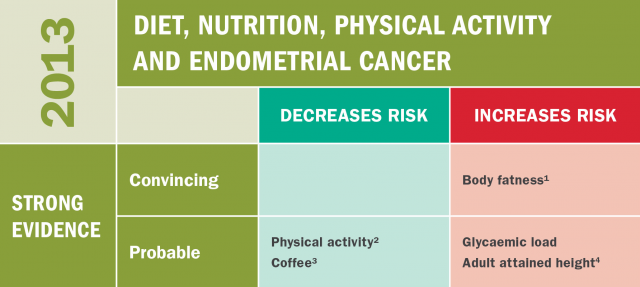Endometrial cancer is the most common cancer of the female reproductive organs.
AICR’S latest report on endometrial cancer found that exercising regularly, drinking coffee, and maintaining a healthy weight can lower your risk. Eating a high-glycemic diet and carrying extra body fat were all linked to a higher risk.
Lifestyle and endometrial cancer risk.
- Weight
As you gain body fat, your risk increases.
- Being overweight and obese increases blood levels of insulin and related hormones that can encourage the growth of cancer.
- Excess fat also creates a pro-inflammatory environment in the body that can contribute to the growth of cancer.
- Physical Activity
Regular physical activity protects against endometrial cancer, but a sedentary lifestyle increases your risk.
- Age
Most cases are diagnosed in women over 60.
- Diet
If your diet revolves around foods high in refined carbohydrates and sugary drinks (high glycemic load), you’re at a higher risk for endometrial cancer.
- Glycemic load is a measure of how much a food increases your blood sugar.
- A diet high in glycemic load can lead to high blood sugar, which can increase insulin levels. Over time, high insulin levels make it easier for cancer cells to grow.
- Coffee
Drinking coffee — both decaffeinated and caffeinated reduces risk.
- In laboratory studies some coffee components, including chlorogenic acid, have displayed strong antioxidant properties that may prevent DNA damage, improve insulin sensitivity and inhibit glucose absorption in the intestine, all of which may reduce risk.

Foods that fight cancer.
No single food can protect you against cancer by itself. But research shows that a diet filled with a variety of vegetables, fruits, whole grains, beans and other plant foods helps lower risk for many cancers.
Cancer Updates
The science of survival.
AICR’s health guides and recommendations are developed from research that focuses on how nutrition and lifestyle affect the prevention, treatment, and survival of cancer. Paramount to our updates is the Continuous Update Project which helps you stay on top of new findings, and understand the data that sits at the center of our work.






